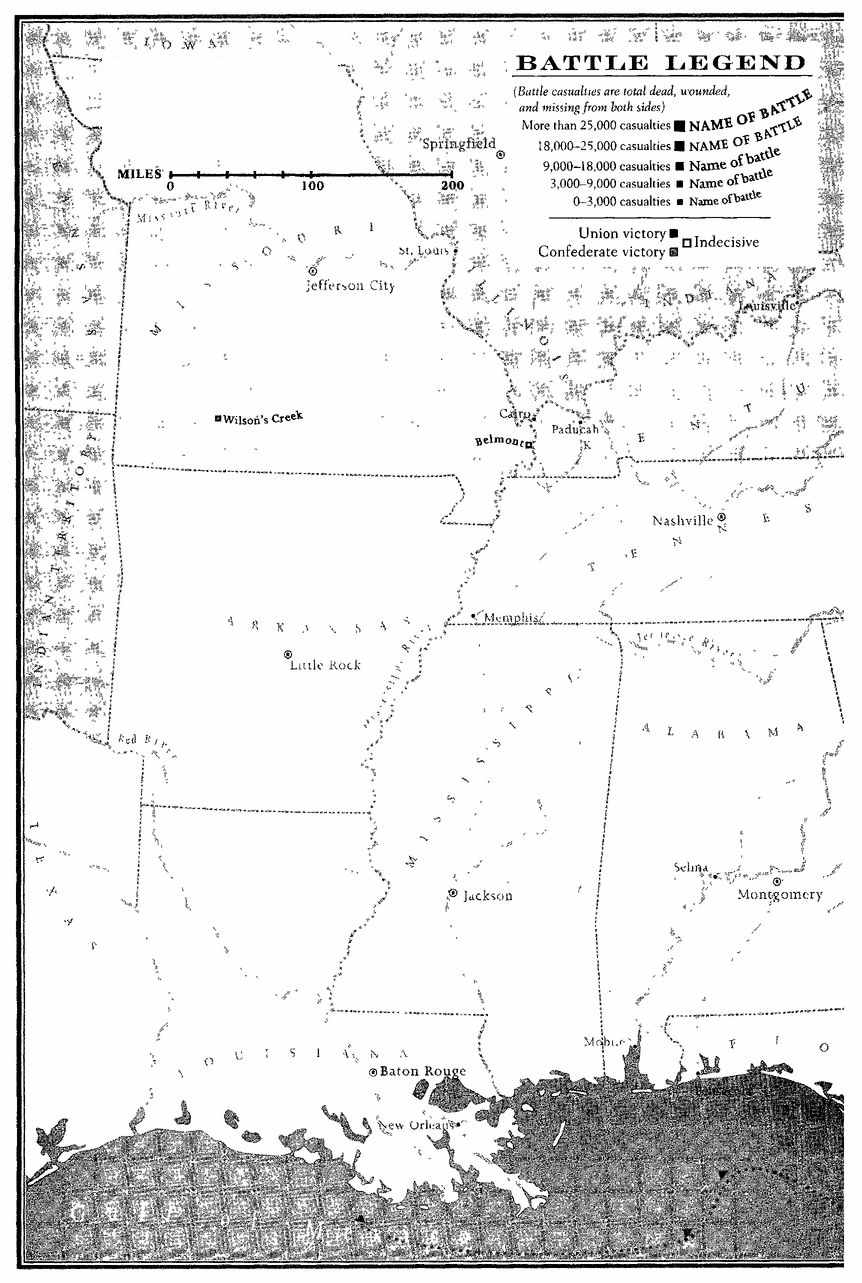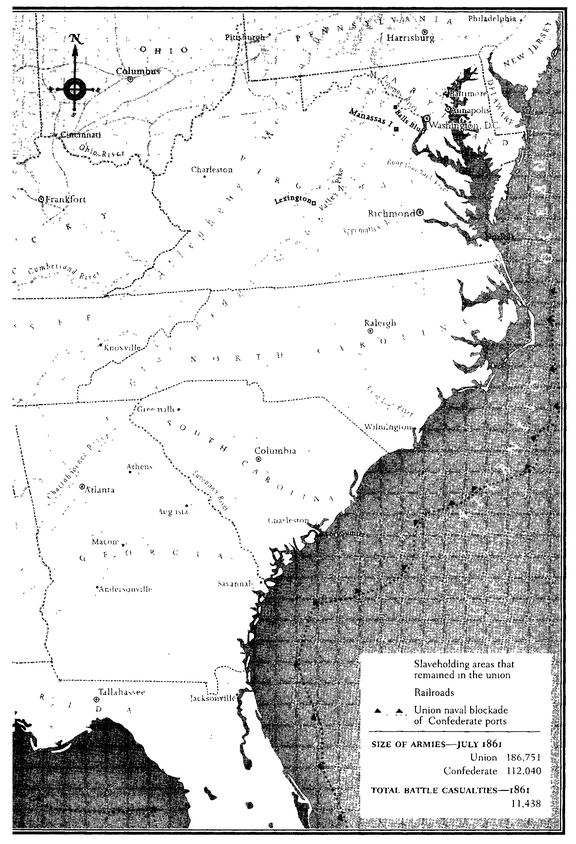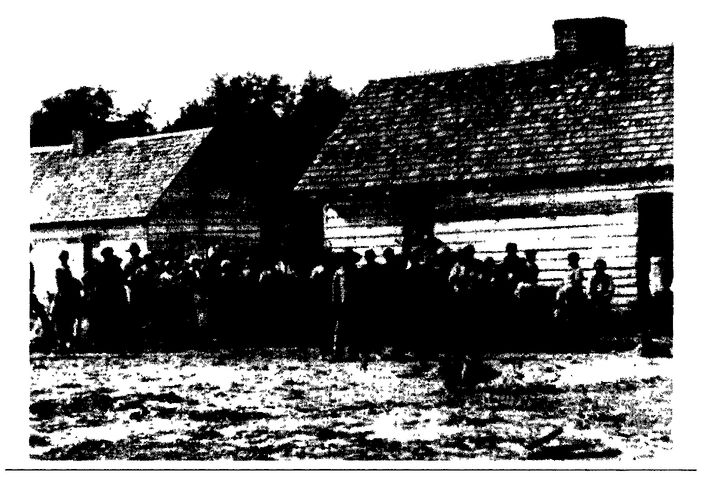Upon the Altar of the Nation (18 page)
Read Upon the Altar of the Nation Online
Authors: Harry S. Stout

While West Point culture may have bred “gentlemen,” manliness was a separate matter, and one not easily reconciled with evangelical piety. In North and South alike it referred to the powerful bonding of men in the ranks as they prepared for battle. Often it would be associated with “manly” activities like drinking, gambling, and fighting—activities far removed from the restraints of evangelical culture. “Pride of manhood” steeled soldiers to combat and countered their greatest fear, the fear of cowardice. The ultimate “test” of manhood came in combat, but feistiness in the camp characterized soldiers’ poses as well. As the human destruction of war magnified in the coming years, manliness would come to be coupled with evangelical Christianity, especially in the South, but in the beginning the tensions between the two were more typical.
16
The wonder is that so many chaplains served at all. One of the strongest indexes to the power of religion in the Confederacy (and the army) is that anywhere from six hundred to eleven hundred chaplains served actively during the war (though fewer than fifty served through the entire war). In time, manly generals who derided chaplains as “effeminate” would have opportunity to revise their estimations.
16
The wonder is that so many chaplains served at all. One of the strongest indexes to the power of religion in the Confederacy (and the army) is that anywhere from six hundred to eleven hundred chaplains served actively during the war (though fewer than fifty served through the entire war). In time, manly generals who derided chaplains as “effeminate” would have opportunity to revise their estimations.
If men were supposed to be men, women were supposed to be women, but not in God-offending “luxurious” ways. The Southern religious press warned women about the limits of femininity, in particular during time of war. In preparation for the November fast, the Methodist organ
Southern Christian Advocate,
“a Religious Family Newspaper,” urged women in particular to dress modestly as befits their superior piety and patriotism:
Southern Christian Advocate,
“a Religious Family Newspaper,” urged women in particular to dress modestly as befits their superior piety and patriotism:
Women may be adorned, but let them wear the ornaments of a meek and quiet Spirit, with modest apparel, rather than those of a foolish and fashionable world.... The fashions of the world—and insane love of dress and outward adornment—has destroyed—to use no stronger term—both the church and the world together, and the devil has become almost absolute monarch of all he surveys.
17
17
Richmond’s Thomas Moore preached to the First and Second Presbyterian churches praising the purifying effects of war on the sins of materialism and “effeminacy.”
18
18
The November fast-day sermons echoed the already familiar themes of the jeremiad, punctuated with a more sober this-worldly realism. Preaching at Christ Church in Savannah, Stephen Elliott warned that the heady days of Manassas were gone: “We are only at the beginning of a long and bloody conflict, and it is the duty of everyone to consider it so and prepare himself for such a contingency.” Recognizing that Davis and Beauregard were still feuding over the honors of Manassas, and that the citizenry was joining in the debate, Elliott enjoined all to honor the administration or deliverance would not be granted.
19
19
In a fast-day sermon addressed to the Georgia state legislature, Mercer University professor Henry H. Tucker spoke on
God in the War.
His theme was Providence and divine protection. The South was innocent, he reiterated, and “thus, the guilt of those who wage this diabolical war on the unoffending people of the Confederate States, finds no apology in the providence of God.”
20
God in the War.
His theme was Providence and divine protection. The South was innocent, he reiterated, and “thus, the guilt of those who wage this diabolical war on the unoffending people of the Confederate States, finds no apology in the providence of God.”
20
1861


Fast-day worship services were held in all Southern churches and incorporated large congregations. Even Mary Chesnut backed away from her occasional skepticism to endorse the fast. On November 16 she entered in her diary: “We fasted and prayed—and we think our prayers are answered, for lo! good news has come. Another ship with ammunition and arms has slipped into Savannah. If our prayers are to be so effective, let us all spend our days and nights on our knees.”
21
21
The South’s lament was the North’s joy and an occasion for thanksgiving services that would unite soldiers and citizens in praise to God for victory. By late autumn, traditional thanksgiving days would be observed with cautious celebration. Although President Lincoln did not proclaim an official Thanksgiving observance until 1862, the tradition was so strong that Northern churches and states observed self-proclaimed days of thanksgiving for Thursday, November 28, 1861.
Unlike abolitionist radicals, the main body of ministers agreed with statesmen, journalists, and generals that the preservation of the Union was a sufficient cause to wage war against the Confederacy, and that victory would confirm its divine justness. While most ministers claimed to avoid “political preaching” in their Sunday worship services, all knew the fast and thanksgiving weekdays marked the occasion for explicit moral and spiritual reflection on the war. Not surprisingly, the war dominated these pulpit performances, and all understood what God’s intentions would be.
Encouraging reports of a successful naval blockade and the capture of Port Royal lent a more optimistic air to the thanksgiving occasion. Also encouraging was the founding of the Christian Commission by the YMCA in November 1861, designed to serve as an evangelical alternative to the more secular and professional Unitarian-based Sanitary Commission. The Christian Commission could work with chaplains to minister to ailing soldiers, provide needed supplies, and Christianize them with tracts and testimony The commission also began efforts to educate former slaves wherever they encountered them.
22
22
In New York Henry Ward Beecher mounted his esteemed pulpit and reiterated the global stakes attached to this fratricidal war: “A battle on the Potomac for our Constitution, as a document of liberty, is the world’s battle. We are fighting, not merely for our liberty, but for those ideals that are the seeds and strength of liberty throughout the earth.” The word “liberty” was important to Beecher as a code word for the hidden cause of emancipation that many Northern clergy had long harbored.
Beecher hoped a way could be found to emancipate slaves in the South, but without usurping protections granted by the Constitution. Though strongly emancipationist, he was no abolitionist in the strict sense of the term. To betray the Constitution by making abolition in the South the war’s formal end might actually imperil the cause and its justness. If choices needed to be made, the Constitution and not emancipation must be honored: “If there be given to us no right by our Constitution to enter upon the States with legislation subversive of their whole interior economy, not all the mischiefs [sic] of slavery, and certainly not our own impatience under its burdens and vexations, should tempt us to usurp it. This conflict must be carried on
through
our institutions and not
over
them.”
23
through
our institutions and not
over
them.”
23

Slaves standing in front of buildings on Smith’s Plantation in Beaufort, South Carolina. Once liberated, many of these slaves disproved their owners’ racial prejudices by their aptitude for literacy and skilled labor.
If there was good news, there was still ample cause to be nervous. This was precisely the message of Gardiner Spring, pastor of Brick Presbyterian Church of New York City and a former friend of the South, who, despite his support for the Union, had little good to say about American character and its misplaced global pretensions: “Instead of moving on in our course courageously and faithfully ... our hearts have been lifted up, we have walked loftily, rushing in the pursuit of greatness, reckless and extravagant, and confident of our resources.”
Such language might sound disloyal, but to congregations attuned to the logic of the jeremiad it was just the opposite—a confirmation that God was still on the side of the North, awaiting repentance and reformation as prelude to ultimate victory. Despite her flaws, America still remained the world’s best hope because America was favored by God. For this transcendent reason, rebellion against America and its Constitution was not just a political violation but a “sin against God and man.” In the end, the political issues came down to morality: “The simple question is, Is this secession of the South morally right?” Of course the answer was no. Therefore, while war is an evil, “a Southern Empire, extending to Cuba and Mexico, with the slave-trade as its basis, is ... a greater evil.”
24
24
In the South, jeremiads appeared in the secular press no less than the religious. On January 10, 1862, in an editorial mixing judgment with bravado, the
Richmond Daily Dispatch
assured its readers that Lincoln would be held accountable for his sins:
Richmond Daily Dispatch
assured its readers that Lincoln would be held accountable for his sins:
Wo, then, wo the usurper who has forced this war upon an unoffending people. The maledictions of Eternal justice rest upon the tyrant’s soul. There is blood upon his hand, blood upon his garments and upon his threshold; the blood of the innocent and the just. Let the thought inspire the hearts and nerve the arm of all true patriots ... this particular war is not an unmixed evil. War elevates and expands the heroic part of man’s nature: “The nations most favored by God have been baptized in the crimson laver of battle, and the holiest of saints have not worn the crown until they have borne the cross.”
25
25
Chaplain Robert Bunting, who served with the Texas Rangers, described the battle scene in a letter to the
San Antonio Herald:
“Surely ours is now a peculiar lot.... Whilst but a short distance below us the enemy’s ships are blockading our river and his dreaded guns of war are booming out a salute over the ruins of a sister city, laid half in ashes by the incendiaries torch. Surely we live in stirring times. Strange scenes all around us. But God reigns, therefore will we not fear.”
26
San Antonio Herald:
“Surely ours is now a peculiar lot.... Whilst but a short distance below us the enemy’s ships are blockading our river and his dreaded guns of war are booming out a salute over the ruins of a sister city, laid half in ashes by the incendiaries torch. Surely we live in stirring times. Strange scenes all around us. But God reigns, therefore will we not fear.”
26
The logic of the Northern and Southern jeremiads made it virtually impossible for preachers and moral savants to register judgments of uncertainty or ambiguity. No moral spokesman could attribute victory to the mendacity and immorality of his generals and soldiers just because they had more guns, and no savant could attribute defeat to, say, a sudden upsurge in religious revivals.
The rhetoric was pat, the originality nil. Speakers and writers employed stock arguments to draw on reflexively, depending on immediate events. Victories brought out the language of selfless humility, prayer, godly conversation, and revival that pleased the divine deliverer, while defeats brought out the language of pride, effeminancy, greed, and materialism that exposed a people not right with God, and in need of the loving discipline of defeat. Like death itself and the funeral sermons that followed, the jeremiad allowed no room for rhetorical creativity. Only a traitor would violate the conventions of the jeremiad or invoke nonprovidential explanations like “luck,” “fate,” or “.incompetence.”
Already in 1861, the jeremiad established a clinching of the rhetorical war knot, closing off alternatives or compromises. Were leaders in power able to see both sides as right and wrong, then alternatives to war might be explored. But in an atmosphere of absolute right and wrong, with God in control and demanding the total surrender of sin and evil, few could escape the trap. In fact, one of the few who could was in the White House. Lincoln did perceive right and wrong on both sides and did seek to explore alternatives to war. But the populace was rapidly losing the capacity to listen.
Other books
The Gypsy's Dream by Sara Alexi
The Closer You Get by Kristi Gold
Wrong by Jana Aston
Heliopolis by James Scudamore
Jade in Aries by Donald E Westlake
The Vastalimi Gambit by Steve Perry
For Love of Audrey Rose by Frank De Felitta
Marauder Cygnus: A Scifi Alien Shifter Romance (Mating Wars Book 1) by Aya Morningstar
White Hot: A Patrick & Steeves Suspense by Kate Fargo
The Shadow Girls by Henning Mankell